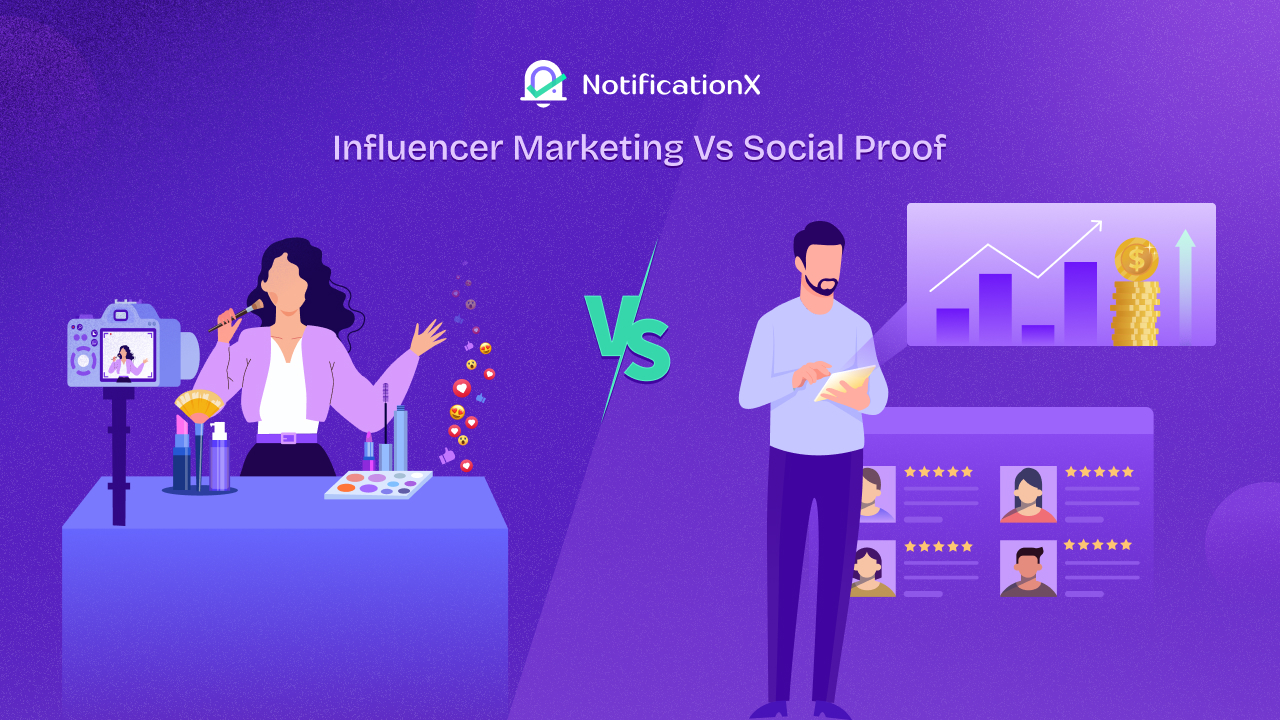When you are in the driver’s seat to expand your brand and enhance your business reputation, choosing a winning marketing strategy must be on your to-do list. When attempting to leverage mass media interaction and reach, you can choose between influencer marketing and social proof. To help you choose the best strategy for your business, we dug deep and created an in-depth comparison between influencer marketing vs social proof marketing. Let’s begin reading to broaden your knowledge of marketing strategy.

What Is Influencer Marketing in a Modern Marketing Strategy?
Simply put, influencer marketing is a type of social media marketing that relies on endorsements and product or service recommendations from media influencers who have a large following and are likely to have expertise in their field of work. It is the process of promoting products and services through these influencers to drive traffic and encourage actions from their audiences, particularly purchases, among a brand’s target audience.
Essentially, influencer marketing consists of renowned personalities whose word-of-mouth marketing and content are used to endorse and advertise a brand. Influencer marketing takes over traditional marketing strategies that rely simply on advertising products and services to customers.
Anyone with a large following and credibility who can persuade their followers to take action can be approached about promoting a brand's product or service on social media platforms.
What Is Social Proof & Impact on Consumer Behavior?
Social proof is based on the fundamental human instinct to mimic the actions of others, particularly in uncertain situations. In digital marketing, social proof refers to the impact that other people’s actions and feedback have on potential customers. It is an age-old survival strategy reimagined for the digital age, where every like, share, comment, and review is a subtle nudge in the right direction.
Why do we believe the words of a product reviewer we have never met? Why are we compelled to buy something after seeing a celebrity endorse it? The answers are found in the shared reference points of our collective psyche.
The influence of social proof and perceived consensus extends across cultures and time, outlasting fleeting trends. This universal appeal implies that social proof taps into a deeper collective unconscious, a pattern identified by psychologist Carl Jung.
Influencer Marketing vs Social Proof – Let’s Decode the Winning Strategy for Your Brand
In the realm of digital marketing, brands continuously seek strategies to amplify their reach and resonate with their target audience. Two of the most prominent strategies are influencer marketing and leveraging social proof for marketing. Understanding the nuances and benefits of each can help determine which strategy best suits your brand.
As part of our research, we prepared a detailed comparison between influencer marketing vs social proof, pinpointing your brand’s persona. Let’s hop in to discover the winning strategy for your brand.
Roles in Marketing: Influencer Marketing vs Social Proof
As our main goal is to maximize your brand reach and analyze performance marketing key points, let’s start with roles in the marketing of influencers vs social proof strategies. Here, we have shared both perspectives.

Social Proof: Social proof builds trust and credibility by showing potential customers that others have had positive experiences with a product or service. It leverages the collective opinion and actions of the crowd to reassure and persuade new customers.
Influencer Marketing: Influencer marketing aims to leverage the influencer’s reach and credibility to promote products and drive engagement. It uses the personal influence and persuasive power of the influencer to connect with a target audience on a more personal level.
Benefits of Choosing These Strategies: Social Proof and Influencer Marketing
Both marketing strategies have advantages, depending on your brand’s structure and requirements. Here we have listed down the benefits of choosing influencer marketing vs social proof strategies.
Influencer Marketing Benefits:
- Extended Reach: Influencers have large, engaged audiences, allowing brands to reach a wider demographic.
- Credibility and Trust: Influencers have built trust with their followers, and their endorsements can enhance brand credibility.
- Engagement: Influencers create content that sparks conversation and engagement, increasing brand visibility.
- Targeted Marketing: Influencers often have niche audiences, enabling brands to target specific segments effectively.
Social Proof Benefits:
- Credibility: Genuine reviews and testimonials can significantly boost a brand’s credibility.
- Cost-Effective: Leveraging existing customer feedback is often more affordable than influencer partnerships.
- Trust Building: Potential customers are more likely to trust the opinions of their peers, especially if the social proof or review comes from an acquaintance.
- Conversion Rates: Positive social proof can lead to higher conversion rates as it reassures potential customers.
Challenges You May Face Implementing These Marketing Strategies
Every good solution carries its own baggage. It is up to us to evaluate and choose the one with the least baggage. To help you out, we have listed down the major challenges you may face. It is time to look into the difficulties you may encounter when implementing influencer marketing vs social proof.
Challenges of Influencer Marketing:
- Cost: High-profile influencers can be expensive to collaborate with.
- Authenticity: Over-commercialization can lead to a lack of authenticity and trust.
- ROI Measurement: It can be challenging to measure the direct impact of influencer campaigns on sales.
Challenges of Social Proof:
- Negative Feedback: Negative reviews can harm a brand’s reputation. However, auditing them would reduce the credibility or authenticity of the brand.
- Management: Continuously generating and managing social proof requires effort and resources.
- Authenticity: Fabricated reviews can lead to a loss of trust if discovered.
Are Influencer Marketing & Social Proof The Same Thing in The Context of Digital Marketing?
In the context of the present digital marketing definitions, social proof and influencer marketing are related but distinct concepts. They are not the same thing, although they often intersect and complement each other within broader marketing strategies. Here’s a detailed breakdown to clarify their differences and connections:

Source of Influence
Let us distinguish between influencer marketing and social proof in terms of the source of influence.
Social Proof: Derived from the general public’s feedback and actions (e.g., customer reviews, testimonials).
Influencer Marketing: Derived from specific individuals who have built a following, on social media and other related platforms and influence within a particular niche.
Building Trust Dynamics
The ultimate goal of selecting one of the above-mentioned marketing strategies is to build the credibility of your brand. In this section, we have differentiated based on building trust dynamics.
Social Proof: Trust is built through the quantity and authenticity of user feedback. In the labyrinth of online shopping, testimonials and reviews are guiding lights. They’re more than mere opinions; they’re narratives that weave a story of trust around a product or service.
Influencer Marketing: Trust is built through the influencer’s personal brand and relationship with their audience. The technique leverages the trust factor that influencers build with their followers or subscribers. Their suggestions act as social proof for a brand’s potential customers.
Cost of Implementation
Cost plays a big role in deciding which marketing strategy is suitable for you. Let us look at how social proof and influencer marketing differ in terms of cost.
Social Proof: As you can see, cost is a big challenge for influencer marketing. However, social proof is based on organic customer feedback, so it is typically affordable.
Influencer Marketing: Due to fees and production costs, this can be costly, especially with high-profile influencers.
Real-Life Use Cases of Influencer Marketing vs. Social Proof
Real-life case studies consistently inspire and clarify our decision-making process. We have compiled the best examples of influencer marketing vs social proof from tested and proven cases. Let’s have a glance.
Examples of Social Proof:
- Customer Reviews and Ratings: Feedback from customers on platforms like Amazon, Yelp, and Google.
- Testimonials: Written or video endorsements from satisfied customers displayed on a website or in marketing materials.
- Case Studies: Detailed analyses of how a product or service has benefited specific customers.
- User-Generated Content: Photos, videos, and posts created by customers that showcase their experience with a product.
- Social Media Shares and Likes: Engagement metrics on social media posts.
- Endorsements from Authorities: Recognitions or awards from reputable organizations or industry experts.
Examples of Social Proof:
- Nike and Cristiano Ronaldo: The campaign relies on Ronaldo’s personal influence and massive following.
- Daniel Wellington and Micro-Influencers: This approach uses the targeted reach and personal trust that micro-influencers have with their followers to create content.
- Fiji Water and The Golden Globes: The campaign capitalized on the visibility and influence of celebrities at a high-profile event.
- Lush Cosmetics and Influencer Takeovers: The takeover allows the influencer’s personality and voice to guide the brand’s content for a day, creating a unique and engaging experience.
How to Combine Influencer Marketing & Social Proof Together for Optimal Outcomes?
Social proof and influencer marketing are not the same within the current digital marketing context, though they often intersect. Social proof is about leveraging the collective opinion and actions of the general public to build trust.
On the other hand, influencer marketing focuses on leveraging the influence of specific individuals to reach and engage a target audience. While distinct, social proof and influencer marketing can complement each other effectively:
- Influencer-Generated Social Proof: Influencers can create content that acts as social proof. For example, an influencer’s review or testimonial can be seen as credible social proof for their followers.
- Amplifying User-Generated Content: Influencers can share and amplify user-generated content, blending social proof with influencer reach.
- Campaign Integration: Brands can run campaigns that encourage customers to create content (social proof), which is then highlighted by influencers to maximize reach and impact.
5 Key Factors to Consider When Choosing the Right Marketing Strategy
We looked at the fundamental differences between influencer marketing vs social proof, as well as their benefits and drawbacks. Now it is time to learn how to analyze your brand and what factors to consider before implementing any of the above-mentioned marketing strategies.
- Target Audience: Understand where your audience spends time and what influences their purchasing decisions. If they follow specific influencers, influencer marketing might be more effective. If they rely on peer reviews, social proof could be the way to go.
- Budget: Assess your budget constraints. Influencer marketing, especially with high-profile influencers, can be costly. Social proof, while resource-intensive, can often be more affordable.
- Brand Objectives: Define your objectives. If you aim to increase brand awareness rapidly, influencer marketing might be suitable. For building long-term trust and credibility, social proof is often more sustainable.
- Product Type: Consider the nature of your product. High-involvement purchases might benefit more from detailed reviews and testimonials, whereas lifestyle products might thrive with influencer endorsements.
- Measurement and Analytics: Determine how you will measure success. Influencer marketing requires tracking engagement, reach, and conversion metrics. Social proof requires monitoring review sites, social media, and direct feedback channels.

Win Your Customers Trust & Grow Your Brand
We can conclude from the preceding discussion that understanding and strategically combining both can improve your brand’s credibility, reach, and conversion rate. To outperform your competitors in today’s market, choose the right marketing strategy. Both influencer marketing and implementing social proofs can have a significant impact on your brand’s revenue and growth curve. You should continue to conduct A/B testing with all marketing strategies and preserve the best output.
Here are more marketing resources you should consider:
⭐ A Beginners Guide on Performance Marketing; How to Get Best Results
Omnichannel Marketing: Easy Guide To Create The Best Strategies
Empathy in Marketing: Understanding the Value of Accessibility
10 Internet Marketing Myths That You Need To Avoid From Now
Moment Marketing: 10 Examples & Case Studies You Need To Know
Sustainability In Marketing: Trends And Best Practices For 2024
Hopefully, we have guided you correctly in decoding the winning strategy for your brand. Share your experience with us and subscribe to our blog for more marketing tips and tricks.






